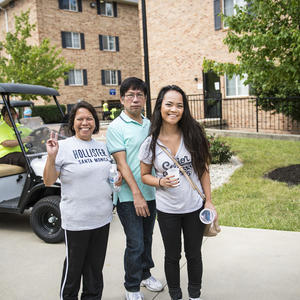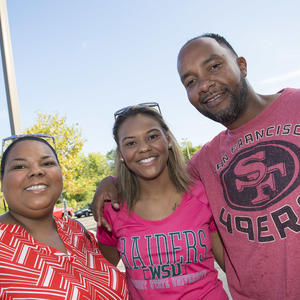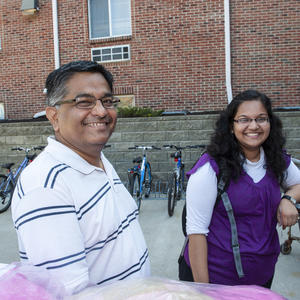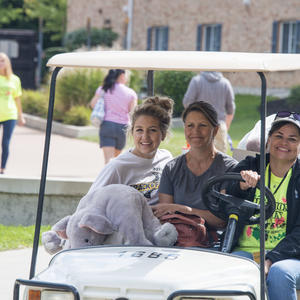Parent Housing Guide

On this page:
- Welcome Parents and What To Expect
- What to Expect
- Common Concerns of First-Year Students
- Safety and Security Tips
- Dining Plans and Dining Services
- Housing Contracts and FERPA
- Related Links and Forms
- Photo Gallery
Welcome Parents and What To Expect
Whether this is your first experience with higher education or another step in a long family tradition, you know that this is a critical passage for your son or daughter. As they take on new challenges, they prepare for full-fledged adulthood. It is our privilege to participate in that process.
We actively enhance the quality of life on campus, support the academic needs of your student, and complement the academic goals of Wright State University. You and your students is invited to become a full partner in this endeavor. National research and our experience show that students who live on campus perform better academically and graduate earlier than their off-campus counterparts. Encourage your student to take full advantage of this marvelous opportunity.
We are committed to providing students with safe, clean, well-maintained, reasonably priced housing where both academic success and personal growth are promoted. So, please call on us if we can help in any way.
What to Expect
 The first year of college is an exciting, yet challenging, experience. Your students may be leaving home for the first time and feeling a great deal of anxiety about what lies ahead. Your role during this time is an integral part of the experience. How you respond to your student's concerns can have a great impact on their adjustment and success.
The first year of college is an exciting, yet challenging, experience. Your students may be leaving home for the first time and feeling a great deal of anxiety about what lies ahead. Your role during this time is an integral part of the experience. How you respond to your student's concerns can have a great impact on their adjustment and success.
Being a parent of a first-year college student can be difficult at times. You feel frustrated and helpless. You must be prepared to listen and answer such concerns as "I don't like my roommate" or "this professor doesn't like me," or even "I want to come home." These are common concerns and you play an important part in the valuable process establishing independence for your student.
You should challenge yourself to be supportive while allowing your student to take the proper steps towards adulthood. You can empower your student with the skills and resources needed to make responsible decisions. Even while at home, parents play an important role in the process.
Common Concerns of First-Year Students
- Homesickness—It is common for first-year students to feel homesickness, especially during the first six weeks on campus. You can help by listening to your student and validating their feelings, offering to come and visit, or encouraging your student to speak to a residence hall staff member or the counseling center.
- "There is nothing to do here"—First-year college students sometimes struggle to get involved. Although students do have to take some initiative, opportunities to get involved are available at virtually every corner—intramural activities, student leadership organizations, athletic teams and events, and social functions. Refer your student to the Office of Student Involvement and Leadership or Campus Recreation to find an organization or activity that fits their interests. Residence hall staff regularly offer social and educational programs right in the building, giving students an opportunity to interact with fellow Raiders and learn skills that can help in class performance.
- Academic Anxiety—Academic anxiety is common among first-year students. If you sense that your student is experiencing anxiety related to classes or coursework, a number of resources are available to help: class instructors, community directors, resident assistants, the Student Success Centers, and the Office of Counseling and Wellness Services.
- Roommate Conflicts—Quite often, roommate conflicts arise because roommates fail to communicate their expectations to each other. If your student has a problem with a roommate, encourage them to sit down and calmly discuss the situation with their roommate. If you feel they may need assistance, refer them to the resident assistant or community director. Staff will attempt to first resolve any conflicts with a roommate agreement. Most students find it extremely beneficial to complete a roommate contract at the beginning of the school year when all roommates sit down together and discuss rules for the room. The roommate contract becomes an extension to the Code of Student Conduct should problems arise.
Safety and Security Tips
 We take many steps to ensure the safety and security of our residents, including keeping hallway entrances locked 24 hours a day and making sure that a staff member is on duty in each area whenever the community office is closed.
We take many steps to ensure the safety and security of our residents, including keeping hallway entrances locked 24 hours a day and making sure that a staff member is on duty in each area whenever the community office is closed.
Even though Wright State takes these precautionary steps, we rely on the students in our communities to take proactive steps to ensure the safety and security of all of our communities. Developing simple habits from the moment your student arrives on campus can help avoid big problems and headaches in the future.
- Lock your doors and carry keys whenever you are away from your room. Students should do this even if they are only going next door.
- Do not prop open any exterior doors or allow them to be propped open.
- Keep pictures and a record of the serial numbers on your television, computer, stereo, bike, etc. Your student may also want to consider engraving these items with their initials or an identification number.
- Protect items such as credit and ATM cards.
- Report theft. If your student should have some of their valuables stolen, your student can take action. They should tell a staff member who can fill out an incident report. Next, file a report with the Wright State police. You can then give them the serial numbers and copies of pictures that you have taken of your valuables.
Fire Safety
When the fire alarm sounds, your student is required by law to evacuate the building, even in the event of a false alarm. The Fairborn fire marshall will administer fire drills randomly during the academic year. All individuals are to proceed 100 feet away from the building. Students who do not vacate will be subject to judicial action. Any student who knowingly or accidentally causes a fire will be handled through the Office of Community Standards and Conduct.
Sprinklers
Sprinkler heads must not be tampered with or used as a means to hang personal items. Some of our facilities are equipped with sprinkler systems that will extinguish most major fires. These sprinklers put out 250 gallons of water per minute. You may end up flooding your room and many others at the same time. Wright State is not responsible for the loss you may incur as a result of someone else's negligence. A resident who knowingly or accidentally causes a sprinkler to activate may be charged in the judicial process.
Dining Plans and Dining Services
Wright State University Dining Services provides dining, catering, and concessions on campus. For students living in Hamilton Hall, The Woods, or the Honors Community, a resident dining plan is mandatory. For those students living in other areas of campus housing (Forest Lane, Village, University, and College Parks), a dining plan is optional. For complete costs, terms, and details about dining plans, please review the options at Dining Services.
Housing Contracts and FERPA
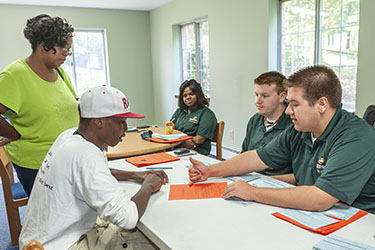 With few exceptions, Wright State students are at least 18 years of age. As such, they are considered adults by both law and practice. We work to create a living environment where students can grow and develop. Part of this maturation process involves testing limits and boundaries. Our judicial process certainly takes this into account. However, an adult student is expected to be responsible for their actions.
With few exceptions, Wright State students are at least 18 years of age. As such, they are considered adults by both law and practice. We work to create a living environment where students can grow and develop. Part of this maturation process involves testing limits and boundaries. Our judicial process certainly takes this into account. However, an adult student is expected to be responsible for their actions.
Housing Contracts
The housing contract is signed by your student. All policies and procedures outlined within it, the terms and conditions, and our sourcebook apply to the student.
Family Educational Rights and Privacy Act (FERPA)
Because Wright State is a state- and federally funded institution, we must follow the Family Educational Rights and Privacy Act (FERPA) which prohibits Residence Life and Housing from releasing any information—besides the most basic information—about the student without the student's permission. This applies to family members. Housing administrative staff will use their best judgment about discussing roommates, finances, complaints, or other problems without the student's permission. In the case of a dire emergency, we may choose to speak to family members.
